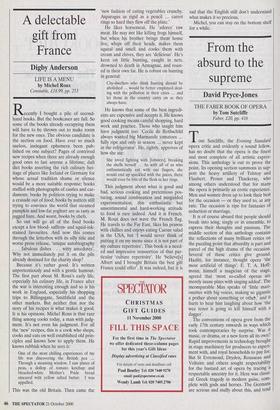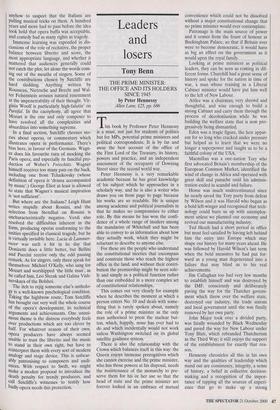From the absurd to the supreme
David Pryce-Jones
THE FABER BOOK OF OPERA by Tom Sutcliffe Faber, £20, pp. 416 om Sutcliffe, the Evening Standard opera critic and evidently a sound fellow, has no doubt that the opera is the finest and most complete of all artistic expres- sions. This anthology is out to prove the point. Its opening section summons in sup- port the heavy artillery of Tolstoy and Flaubert, Proust and Thackeray, who among others understood that for many the opera is primarily an erotic experience. Men and women dress up to look their best for the occasion — or they used to, at any rate. The occasion is ripe for fantasies of seduction or marriage.
It is of course absurd that people should break into song, singly or in ensemble, to express their thoughts and passions. The middle section of this anthology contains the reflections of many brilliant critics on the puzzling point that absurdity is part and parcel of the high drama of the occasion. Several of these critics give ground. Hazlitt, for instance, thought opera 'the most artificial of things'. E. T. A. Hoff- mann, himself a magician of the stage, agreed that 'most so-called operas are merely inane plays with singing added'. The incomparable Max speaks of 'little mari- onettes with big voices, making so gigantic a pother about something or other,' and it hurts to hear him laughing about how 'the wee tenor is going to kill himself with a dagger'.
The conventions of opera grew from the early 17th century onwards in ways which took contemporaries by surprise. Was it music, or drama, or a new form all its own? Rapid improvements in technology brought in stage machinery for producers to experi- ment with, and royal households to pay for. But St Evremond, Dryden, Rousseau and Voltaire and others sought respectability for the bastard art of opera by tracing a respectable ancestry for it. Here was classi- cal Greek tragedy in modern guise, com- plete with gods and heroes. The Germans are serious and stuffy about this, and tend
T
anyhow to suspect that the Italians are pulling musical tricks on them. A hundred years and more had to pass before the idea took hold that opera buffa was acceptable, and comedy had as many rights as tragedy.
Immense learning was expended in dis- cussions of the role of recitative, the proper balance between libretto and score, the most appropriate language, and whether it mattered that audiences generally could not catch the plot, let alone the words com- ing out of the mouths of singers. Some of the contributions chosen by Sutcliffe are hard sledding. Anything written by Rousseau, Nietzsche and Brecht and Wal- ter Felsenstein arouses natural resentment at the impenetrability of their thought. Vir- ginia Woolf is particularly high-falutin' on Parsifal. In the cacophony, all agree that Mozart is the one and only composer to have resolved all the complexities and absurdities into something supreme.
In a final section, Sutcliffe chooses sto- ries about operas, or commentary which illustrates opera in performance. There's bias here, in favour of the Germans. Wagn- er does his favourite turn of mocking the Paris opera, and especially its fanciful pro- duction of Weber's Freischiitz. Wagner himself receives too many pats on the back, including one from Tchaikovsky (whose definition of opera is 'drama accompanied by music'.) George Eliot at least is allowed to state that Wagner's musical inspiration is 'not sufficient'.
But where are the Italians? Leigh Hunt writes stupidly about Rossini, and the selection from Stendhal on Rossini is uncharacteristically negative. Verdi also resolved the difficulties inherent in the form, producing operas conforming to the unities specified in classical tragedy, but he is virtually invisible here. Lucia di Lammer- moor was such a hit in its day that Donizetti does a little better, but Bellini and Puccini receive only the odd passing remark. As for singers, only three speak for themselves: Michael O'Kelly, who sang for Mozart and worshipped 'the little man', as he called him, Leo Slezak and Galina Vish- nevskaya of the Bolshoi.
The itch to rejig someone else's antholo- gy is a well-known psychological condition. Taking the highbrow route, Tom Sutcliffe has brought out very well the whole course of the opera's development, its technical arguments and achievements. One unani- mous theme is the distress everybody feels over productions which are too clever by half. For whatever reason of their own, opera producers have always seemed unable to trust the libretto and the music to stand in their own right, but have to reinterpret them with every sort of modern analogy and stage device. This is unbear- ably patronising to composers and audi- ences. With respect to Swift, we might make a modest proposal to introduce the death penalty for trendy producers, and call Sutcliffe's witnesses to testify how badly opera needs this protection.


























































































 Previous page
Previous page